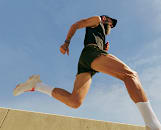
Maskot / Maskot via Getty Images
6 Ways Exercise Helps Reduce Symptoms of Social Anxiety
You know exercise lifts your mood and cuts stress—but did you know it can also quiet social anxiety? Turns out, breaking a sweat might be the key to breaking the ice.
By Kathleen Ferraro•
What Is Social Anxiety?
What to Keep In Mind When Dealing with Social Anxiety
How Can Exercise Reduce Social Anxiety?
Tips for Exercising to Reduce Social Anxiety
When to Seek Professional Help for Social Anxiety
The Takeaway
We’ve all experienced that nervous flutter before a big presentation or meeting someone new. But for some, social anxiety can disrupt daily life and even hold a person back from doing what they want. The good news is that physical activity can help remove some of these social roadblocks. Research shows that working out improves mental health, fosters connection, and nurtures self-esteem, all of which can make being around others feel more pleasant.
Discover more ways to reach your goals with Peloton
We spoke to four experts to get the scoop on how exactly exercise can ease symptoms of social anxiety—plus strategies for building a fitness routine that helps you make connections.
What Is Social Anxiety?
Social anxiety is the intense fear of being judged, embarrassed, or rejected by others, explains Allison Guilbault, a licensed therapist at Mindful Mental Health. About 7 percent of US adults, or some 15 million people, have social anxiety disorder, according to the National Institute of Mental Health. What’s more, a whopping 43 percent of Americans claimed they felt more anxious in 2024 than the previous year, according to the American Psychiatric Association’s annual mental health poll.
Social anxiety and generalized anxiety disorder share similar symptoms, like a racing heartbeat, sweating, difficulty concentrating, trouble breathing, and avoiding anxiety-provoking situations. But “the main difference is that social element—it involves other people,” says Guilbault.
Social anxiety can also make you feel isolated and depressed and lower your self-worth, says Sarah Bolor, a licensed therapist and clinical director at SayIt Mental Health. It typically starts when you’re a teenager or young adult, adds Connie Moroz, a licensed therapist at Sage Therapy, and is slightly more prevalent among women, although it can affect anyone.
What to Keep In Mind When Dealing with Social Anxiety
You can’t just shake it off, especially if you’re not in treatment, says Moroz. “Social anxiety can persist long-term due to ingrained thought patterns, avoidance behaviors, and genetic or environmental factors,” she explains.
This can strain your relationships and hold you back from social, educational, and career opportunities, says Joel Young, MD, a clinical associate professor of psychiatry at the Wayne State University School of Medicine and co-founder and chief medical officer at MindMetrix.
It’s important to note that regular physical activity is a great tool for reducing social anxiety, adds Moroz, but it’s not a fix-all, particularly in cases of severe anxiety where therapy or medication may be necessary.
How Can Exercise Reduce Social Anxiety?
A 2021 review in Frontiers in Human Neuroscience found that regular exercisers experience lower levels of social anxiety. One study in the review found that those who started a regular exercise program reduced their social anxiety symptoms more than those who did not. Another study found that combining therapy with just one 90-minute walking workout per week reduced social anxiety symptoms better than therapy and education sessions alone.
Here’s why exercise can have this powerful effect.
1. It Gets You Out and About
It can be hard to muster the motivation to leave your safe space without a specific reason. Exercise gives you that opportunity, says Dr. Young.
Whether it’s taking a walk, joining a fitness class, or going for a swim, exercise can help you step outside your comfort zone (literally) and feel a part of the world around you.
2. It Normalizes Social Interaction
If major social interactions like one-on-one training or an interactive group workout seems overwhelming at first, that’s normal.
Luckily, you don’t have to go from zero to 60. Exercise exposes you to more manageable micro-interactions, like waving to a fellow jogger, saying “hi” while signing in to a workout class, or using the Leaderboard to send a virtual high five to your fellow Peloton class-goers. These consistent, low-pressure exchanges can steadily increase your comfort with others, says Bolor.

Peloton App
Access thousands of classes with no equipment needed.
3. It Can Strengthen Your Self-Belief
Setting and achieving fitness goals, whether it’s completing a challenging workout or strengthening your stamina, can bolster self-assurance and foster a sense of accomplishment.
This empowerment and resilience can extend beyond the gym and into social settings, like the after-work happy hour. The more assured you feel in your own abilities, the easier it is to take risks and put yourself out there.
4. It Regulates Your Stress Hormones and Boosts Endorphins
When you work out, your body releases feel-good hormones like endorphins. This impact on your brain chemistry can ease anxiety and improve mental wellbeing, reports a 2019 study published in Genes.
What’s more, “exercise promotes the production of neurotransmitters like serotonin and dopamine, which help regulate mood,” says Dr. Young.
Exercise also helps decrease levels of stress hormones like cortisol, which are often elevated during anxiety episodes. This hormone regulation can help you feel more balanced emotionally, which is crucial for managing anxiety, says Moroz.
5. It Regulates Your Nervous System
If your social anxiety feels physical, there’s good reason: Anxiety activates your nervous system, leading to symptoms like a racing heart or sweaty palms, according to the National Library of Medicine. Exercise can help calm your nervous system.
“Whether it’s gentle, restorative movement like yoga or walking, or something more active and intense like HIIT or running, your body has the opportunity to engage in the natural process of regulating your mood and nervous system,” says Moroz. “Channeling your body’s energy and emotions in a productive and healthy way can bring your body and nervous system down from a heightened or activated state to become more calm, restful, and grounded.”
6. It Creates Structure
Regular exercise creates routine, and that predictability helps quell anxiety, says Dr. Young. Sticking to your fitness regimen can also encourage self-discipline and gently desensitize you to certain social settings, both of which further appease anxiety, adds Bolor.
Tips for Exercising to Reduce Social Anxiety
Starting an exercise routine when you have social anxiety can feel daunting. That’s why it’s important to take small, manageable steps. Here are some easy ways to get started.
1. Make a Plan
Trying something new can feel like stepping on stage without a script, but a little preparation can make all the difference.
“Plan out what you want to do and pack the day before so it becomes an exciting activity rather than a daunting task,” says Peloton instructor Ash Pryor. This small step can boost your confidence before getting started.
Knowing what to expect also goes a long way in easing first-time jitters. Set yourself up for success at a new gym or studio by arriving early so you can get the lay of the land, or call ahead with any questions, Ash suggests.
2. Hit the Gym During Off-Hours
If the thought of being surrounded by people while exercising feels overwhelming (hey, gym anxiety is real!), try going to the gym during non-peak hours when it’s less crowded. This can help you feel more comfortable testing out equipment or trying a new routine.
3. Invite a Friend to Work Out
A 2019 study published in Psychological Medicine found that people with social anxiety experience lower levels of anxiety and depression when they’re with close companions. Whether it’s a walk, class, or shared gym session, having a trusted friend or family member by your side can provide an extra layer of comfort and support.
4. Start Slow In Familiar Settings
Don’t feel pressured to jump into intense workouts right away. Begin with shorter sessions, gradually building your endurance and confidence over time, says Moroz. Easing into a new fitness routine can help prevent awkwardness, burnout, and injury.
It’s also a good idea to skip overwhelming settings, she adds. Instead of the hot new gym with nightclub vibes, aim to exercise in a safe, well-known place, such as a jog around the block with Peloton’s Outdoor Run Club, a ride on your Peloton Bike, or backyard yoga.
5. Practice Grace
Not every workout will be perfect, and some days will feel more challenging than others. It’s important to practice grace and self-compassion on those less-than-ideal days as you develop a routine to mitigate your social anxiety, according to Bolor.
6. Sign up for a Fitness Community
Joining a fitness group—even a virtual one—can help you feel more connected to others, according to a 2021 study in the International Journal of Sport and Exercise Psychology. Whether it's a run club or group workout class, getting involved can reinforce your commitment and, over time, ease social anxiety.
Connect with Others Through a Class on the Peloton App
7. Find the Right Fit
“Write down what you need from an instructor, trainer, gym, or community,” says Ash. “Don’t be afraid to say ‘That’s not for me’ and move on.”
Ultimately, fitness should feel empowering and add to your life, not drain it. Find an activity that supports your goals and makes you feel good, physically and mentally.
“Check in with yourself,” Ash adds. “It’s OK if something once was enjoyable, but now it isn’t and you want to pivot. That is why there are so many options in fitness.”
When to Seek Professional Help for Social Anxiety
A clear sign it’s time to change your game plan: “When your social anxiety symptoms are impacting your ability to function or show up in multiple areas of life, such as achievement at work or school, relationships, social interactions, sense of self, and quality of life,” says Moroz.
Therapy, medication, or a combination of both can help you address the underlying causes of social anxiety and develop effective coping strategies. A licensed mental health provider can help determine the best course of action for you.
“In our digital age, there’s no shortage of support to guide you through anxieties, including journal prompts, affirmations, meditation apps, book clubs, [and] podcasts,” says Guilbault. “If you want support, I promise it’s available.”
The Takeaway
Exercise isn’t just about strengthening your body. It’s also a way to support a healthier mind. While it’s not a standalone cure, a regular fitness routine can be a life-changing tool for managing social anxiety. Starting with small, manageable activities or getting active with those you love can help you ease into a fitness routine that helps you reap all of the anxiety-reducing benefits of exercise.
Related Articles

Mental Health
What Is Social Wellness? 5 Ways to Boost This Under-the-Radar Health Fundamental

Meditation
6 Reasons Why Meditation Can Be Incredibly Effective at Easing Anxiety

Beginners
5 Ways to Get Over Gym Anxiety and Work Out with Confidence

Mental Health
Does Exercise Really Improve Your Mental Health? These 9 Benefits Prove It
This content is for informational and educational purposes only and does not constitute individualized advice. It is not intended to replace professional medical evaluation, diagnosis, or treatment. Seek the advice of your physician for questions you may have regarding your health or a medical condition. If you are having a medical emergency, call your physician or 911 immediately.
Strengthen your mind-body connection
Enter your email to get articles, expert-backed tips, and updates from Peloton sent to your inbox.
By providing your email address, you agree to receive marketing communications from Peloton.
For more about how we use your information, see our Privacy Policy.









